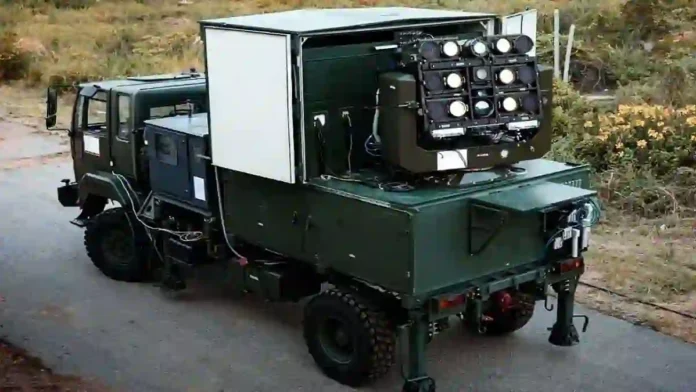India’s Defence Research and Development Organisation (DRDO) is poised to advance its indigenous 30 kW Directed Energy Weapon (DEW), a high-powered laser system, to user trials within the year.
This significant milestone marks a leap in India’s pursuit of advanced military technologies, particularly in the realm of non-kinetic, precision-based defence systems. The 30 kW DEW is designed to neutralize aerial threats such as drones, missiles, and other airborne targets by focusing intense laser energy to damage or destroy them mid-flight.
Read- India Issues NOTAM Warning For Likely Missile Test Off The Odisha Coast
The system, developed under DRDO’s DEW program, has already undergone successful laboratory and field tests, demonstrating its capability to track and engage targets with high accuracy. The laser weapon is mounted on a mobile platform, allowing for rapid deployment and flexibility in various operational scenarios. Its primary advantage lies in its ability to deliver precise, speed-of-light engagement without the need for conventional ammunition, thus reducing logistical burdens and enabling sustained operations.
The upcoming user trials will involve the Indian armed forces, who will evaluate the DEW’s performance in realistic combat environments. These trials are expected to assess the weapon’s effectiveness against a range of targets, its operational reliability, and its integration with existing defence systems.
Read- TEJAS-MK-1A Roll Out From Nashik This Month, Astra Firing Likely In Aug: HAL CMD
Read- India’s Su-30MKI Set For ₹66,829 Crores Super-30 Upgrade, To Outclass Pakistan’s F-16s
The move to user trials reflects growing confidence in the technology and signals India’s intent to field advanced directed energy solutions for both defensive and offensive roles.
The 30 kW DEW is part of a broader effort by DRDO to develop a family of laser-based weapons with varying power levels for different applications, including border security and critical asset protection. If successful, the trials could pave the way for induction of the system into active service, enhancing India’s capability to counter emerging aerial threats and reinforcing its position as a leader in indigenous defence innovation.
IDN
Agencies




